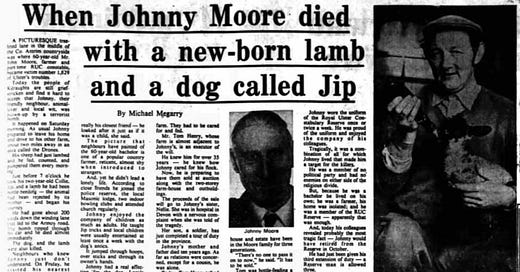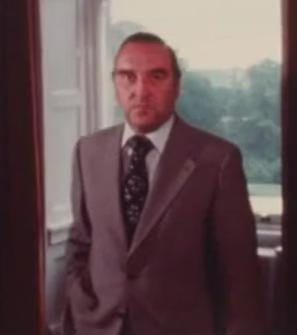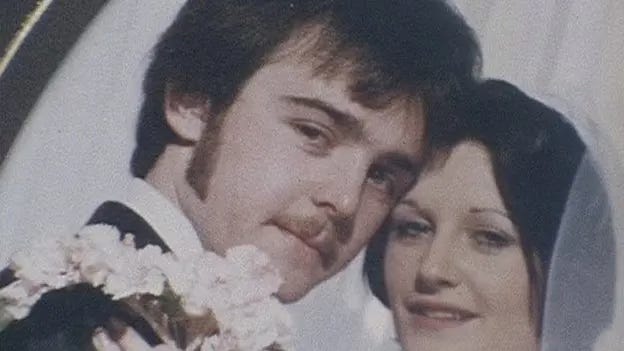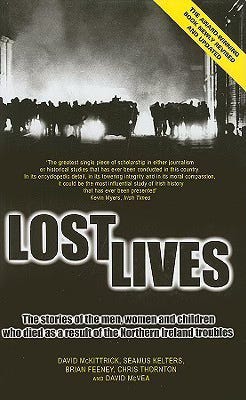April 1978: Not Self-Inflicted
April 1978 saw the TV show "Dallas" starring Larry Hagman and Barbara Bel Geddes premiere on CBS as a 5-week mini-series. Ratings’ success led to a 13-year run. In Northern Ireland, a mini soap opera of sorts was unfolding between the Police Authority and Police Surgeons…
Political Developments in April 1978
April began with more detail about the ongoing focus on the ill-treatment of prisoners. A document dated the 5th of April, detailing a conversation with Police surgeon Dr Weir detailed the following;
Dr Weir asked me to see Dr Irwin, a Police Surgeon, today. Dr Irwin struck me as a solid and unemotional man, concerned about his own professional standards, and aware of the difficulties of the police. He is not a troublemaker or an agitator but is concerned with the general public good, with the dignity and effectiveness of law enforcement and with the human rights of persons in custody. I found him a completely credible witness.
Dr Irwin said that recent representations to the Police Authority had effected no change. He was alarmed at the number of prisoners showing signs of injury which could not have been self-inflicted. These were continuing and were associated with a group of eight or ten policemen who were consistently described to the doctors by injured prisoners and who were familiarly known to the doctors as the 'goon squad'. He was convinced that these officers were maltreating prisoners under interrogation as a matter of policy approved by the Chief Constable. There was a marked increase in the incidence of injury when Deputy Chief Constable Herman was absent on leave.
Relationships between the Police Surgeons and the Chief Constable seem to be poor. The Surgeons are annoyed that although they had written to the Chief Constable on three occasions alleging ill-treatment of prisoners he had publicly denied on TV that they had even made representations to him. They also complained that minutes of liaison meetings with the RUC were doctored to exclude their complaints and then used by the Chief Constable in discussion with the Police Authority to argue that the Surgeons had not complained to the police.
The Surgeons also feel that they were used to secure a favourable report from Amnesty International, and are determined not to be so used again.
Dr Irwin said that in the event of further controversy, they might find it necessary to issue a public statement contradicting the Chief Constable. From their contact with families and prisoners’ GPs, they were satisfied that the cases they were concerned about were known to outsiders and would be used to secure a return visit of Amnesty International. If asked by Amnesty, they were not prepared to stand over the present position and would have to express their doubts about interrogation methods and the non-implementation of agreed precautionary procedures. Some of the injured prisoners might take civil action and the surgeons would be required to give evidence on oath.
It is very obvious to me that the doctors are nearly at the end of their patience and are getting little satisfaction from the Police Authority and less from the Chief Constable. Some of them have been subjected to personal threats by anonymous phone calls. The Surgeons reinforce the message we were already getting from our own medical officers. The police surgeons are however independent contractors and may well feel impelled to public utterance.
Dr Irwin was well aware of the possible political repercussions of any controversy on the subject and was most concerned to prevent trouble and to avoid a public outcry if at all possible.
You might wish to inform Mr Pritchard in NIO of the present state of play, and in view of the possible political implications. The Minister.
On the 7th of April, Conservative party spokesperson on Northern Ireland Airey Neave said that power-sharing no longer represented practical politics. On the same day, British Prime Minister James Callaghan held a meeting with Irish Prime Minister Jack Lynch at the European Community Summit in Copenhagen. The talks helped to ease relationships between the British and Irish governments.
A letter from the Chairman of the Police Authority of Northern Ireland Sir M. Humphries was sent to the Secretary of State for Northern Ireland Roy Mason on the 17th of April, again, discussing the ongoing issue around the mistreatment of prisoners. It read;
Dear Secretary of State.
You will recall that last July at one of our periodic meetings I drew attention to the fact that the Police Surgeons' Association had expressed disquiet about the treatment of persons detained, under emergency legislation, in Castlereagh Police Centre and certain other Police Stations in the Province. We felt at the time, and still feel, that you would wish to be kept informed of the views of an important Association in regard to a highly sensitive matter.
We entered into direct discussions with the Chief Constable about the Police Surgeons' representations which in essence were that a number of injuries to detainees were not, in the opinion of the Police Surgeons, self-inflicted. In the event, the Chief Constable felt that he could not discuss the named cases given to him because it would conflict with his statutory investigative role. There matters rested and the Police Authority preferred not to make an issue of the matter because the Doctors came back in the latter part of 1977 to say that their protests had had positive results in that the cause for complaint seemed to have dried up at source.
This development allowed the Authority and the Doctors to tell Amnesty International in December last, during discussions the Police Authority held with that body in River House, that whilst there had been concern in the early part of 1977 about a number of cases these were being investigated in accordance with the terms of the Police Act and that the situation was now satisfactory. It was pointed out in passing that a committee, chaired by a Senior policeman (Mr Hermon), consisting of members of the RUC, Senior Medical Officers and representatives of the Police Surgeons' Association and of the Police Authority had been set up to deal with organisational, etc. topics connected with the medical examination of detainees in October 1977. In other words a clean bill of health was given to centres where detainees were examined. The Doctors present at the meetings with Amnesty International were Messrs Alexander and Elliott (Senior Medical Officers stationed at Castlereagh and Armagh and seconded to the Police Authority by the Department of Health and Social Services) and Messrs Stewart and Irwin (Chairman and Honorary Secretary respectively of the Police Surgeons' Association). All the Doctors gave
Amnesty an assurance that they would not tolerate any ill-treatment of detainees and indeed would resign if they had cause to believe that such a practice existed. Perhaps I should emphasise that the giving of this assurance was reported to and has been noted by members of the Police Authority.In March of 1978, the Doctors complained that ill-treatment had started again, but notably, Dr Alexander (in a minority of one) stated he had no cause for complaint. Once again the Police Authority approached the Chief Constable and once again the Chief Constable restated the view that his role is restricted by the Police Act (NI) 1970 and that the setting up of the Complaints Board had added a further complicating factor. The Police Authority intend to contest the gravamen of this view.
With some difficulty a meeting of all three parties, ie. The Police Authority, the Chief Constable and the Doctors was convened. Various opposing views were aired and in the end, some key items such as the preparation of documents identifying the role and job content of Doctors carrying out examination of detainees were referred to the Hermon Committee. This is important and may assist in breaking the deadlock which exists between the Police Authority and the Chief Constable.
But while the Hermon Committee's work is of great importance, it cannot solve the main matter which is perturbing the Doctors. Only the removal of the cause for their concern can do that. Meantime, the Doctors are acting within the spirit and letter of the Diplock Report (c.f. para 86 in particular of the Report) in continuing to press their concern and there is apprehension in the Police Authority that one (if not more) of the Doctors may (a) go public or (b) resign or indeed adopt both courses.
It may be felt, to express a rather harsh line of reasoning, that it would solve a number of problems if the more "difficult" Doctors were to resign. This is not the Authority's view because the publicity would be dangerous; it would be difficult, to say the least, to secure a replacement for a man resigning in these circumstances; in any event, a zealous defender of the rights of detainees is, in the long run, a defender of the RUC's good name.
Time is short; we are advised a precipate action is likely within the next few weeks. What then can be done? We think it is important to reassure the Doctors 'and we also think that this can best be done in open forum. We suggest, therefore, a meeting involving all parties, viz. the Police Authority (at Chairman, Vice-Chairman and Secretary level), the Chief and Senior Deputy Chief Constables, the four Doctors plus a representative from the Department of Health and Social Services and that such a meeting should be chaired by Mr Dunn.
We have received details of cases and whilst I do not propose to burden you at this stage with lengthy medical submissions, the names of the persons concerned are listed in the Appendix to this letter. There are others in the pipeline. The time to clear, such cases by normal means is considerable - exceptional cases can take over one year and to accept this in present circumstances may be to court quite serious political and other difficulties.
Finally, I should add that we have the Chief Constable's assurance that he will ensure that there is no delay in the police investigation of all these cases, but he stresses that the DPP's rate of progress is not a matter within the control of the police.
The following day, as suggested above, a meeting took place between members of the Police Authority of Northern Ireland and Officials from The Northern Ireland Office. The minutes of the meeting were as follows;
Mr Dunn had asked Mr Hannigan to arrange the meeting because of the renewed concern about the maltreatment of prisoners being expressed by Dr Elliott of Armagh and other police surgeons. He thanked Mr Dugdale and Doctors Baird and Weir for responding so quickly.
Dr Baird showed Mr Dunn a letter he had received from Doctor Elliott seeking transfer from his duties at Armagh because of what he described was an intolerable situation regarding the maltreatment of persons under interrogation.
Mr Dunn said that he had been brought up to date regarding Dr Elliott's complaints by Mr Baird of the Police Authority earlier in the day and he wanted to get to the root of the problem so that it could be rectified. In this respect, he was seeking advice and guidance. He emphasised his position in so much that he would not condone cruelty to or manhandling of persons being questioned in Armagh or other centres and if it was in fact happening it would have to be stopped.
Dr Baird said that Dr Elliott was an excellent clinical doctor, conscientious and could be relied upon to carry out his duties to the full. He was certain that Dr Elliott, in reporting his concern about maltreatment was acting according to his conscience. His medical reports, two of which were shown to Mr Dunn, were completed in a very objective manner and he devoted part of each to the question of any wounds being self-inflicted. In addition, each report was always corroborated by another medical practitioner. Dr Baird also pointed out that Dr Elliott was not alone in his expression of concern as various backup doctors were noising their unrest.
Dr Weir said that while as far as possible medical services in prisons and in police centres were kept separate, it was apparent that initial medical examinations at prison establishments upheld some of the police doctors’ views on maltreatment taking place. He also referred to the fact that at Castlereagh 60% of persons detained left the centre without medical examination as against 98% being examined in Armagh.
Mr Hannigan raised the question of the circulation of reports of maltreatment. Dr Baird explained that the report was primarily completed for the Police Complaints and Discipline Branch with copies to the Police Authority and himself.
Mr Dunn and Mr Hannigan expressed their concern about possible escalation of publicity and the possibility of Dr Elliott leaving Armagh with the consequence of leaving the matter open for a public argument which would not serve the interests of anyone in Northern Ireland except the men of violence. To move some way to saving the situation and to give any hope to curing the problem for good it was essential that Dr Elliott stay in his position and give everyone a chance to make headway. Mr Dunn asked Dr Baird if he would try to persuade Dr Elliott to do this on the strict understanding that he could be assured of action although, by the same token, he must appreciate that it would all take time. Dr Baird said that he could not absolutely guarantee Dr Elliott's cooperation but was almost sure he would agree. Mr Dugdale agreed that this was the best course of action and suggested that perhaps Mr Dunn should see Dr Elliott himself. Mr Dunn said that it may be advisable for Mr Hannigan to see Dr Elliott but he would bear this in mind. Mr Dugdale and Mr Hannigan undertook to liaise closely and keep Mr Dunn fully informed of developments.
It’s clear from all the correspondence relating to prisoner treatment it was a case of morality standing up to potential bullying.
Politically, April ended with British Prime Minister James Callaghan announcing that legislation would be brought forward to increase the number of Members of Parliament who represented Northern Ireland at Westminster from 12 to between 16 and 18. A Bill was passed at parliament on the 28th of November 1978 which increased the representation to 17 seats.
Shootings & Abductions in April 1978
08/04/78 - Brendan Megraw (23) was abducted from his home at Stewartstown House, off Summerhill Road, Twinbrook, Belfast. His remains were eventually found, on general instructions from the IRA, buried in a bogland, Oristown, near Kells, County Meath, on the 1st of October 2014.
14/04/78 - UDR soldier James McKee (61) was shot dead by the IRA while driving a school bus near Pomeroy, County Tyrone.
14/04/78 - The UVF shot dead Protestant civilian Robert McCullough (27) at his home in Rathcoole.
22/04/78 - RUC officer Miller McAllister (36) was shot dead by the IRA at his home in Lisburn.
30/04/78 - The INLA fired seven shots at a British soldier on the roof of Springfield Road RUC station, west Belfast, striking his helmet but ricocheting off. A grenade was also thrown over the perimeter wall of the base.
If you’d like to support the newsletter, why not buy me a ☕️ ?
Bombings in April 1978
15/04/78 - RUC officer John Moore (57) was killed in an IRA booby-trap bomb attack outside his home near Armoy, County Antrim.
Thanks very much for reading. I hope you found it interesting and will come back on Thursday!
I appreciate everyone who recently hit that heart icon ❤️ at the bottom. It makes it easier for other people to find this newsletter.
Thanks for the support!
I’ve also recently released Tales of The Troubles: Volume 1. The Early Years - 1960s. Check it out. It would be a great addition to your library or a gift for someone for Christmas. Stay tuned for Volume 2, covering the 1970s.
If you’d like to let me know what you think of today’s instalment, please comment below.
Some recommended reading based on research for this instalment.






